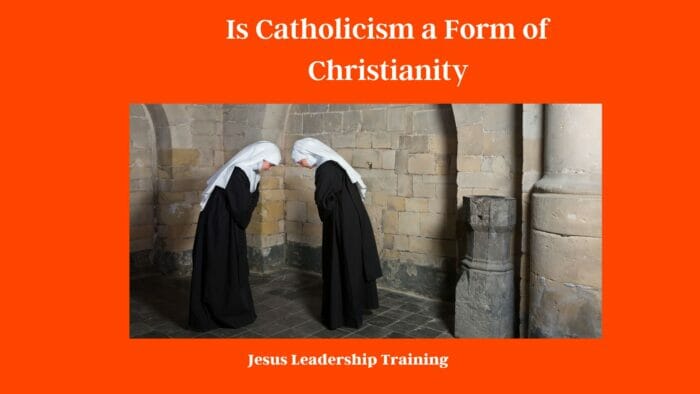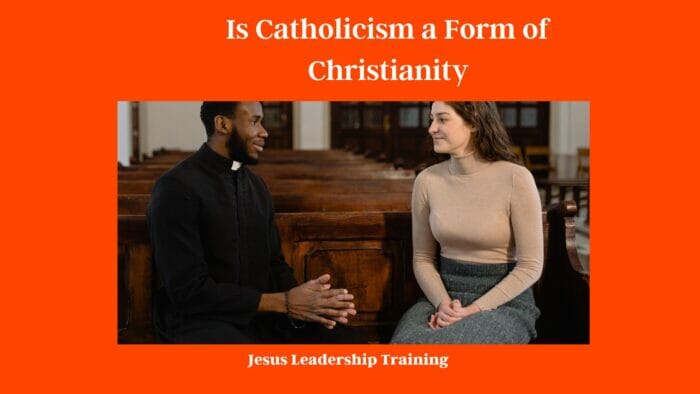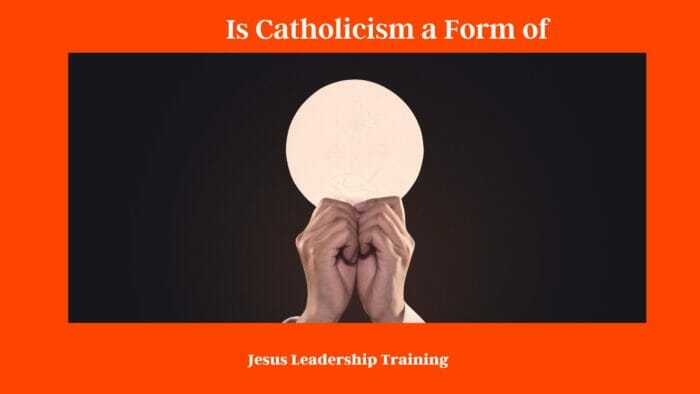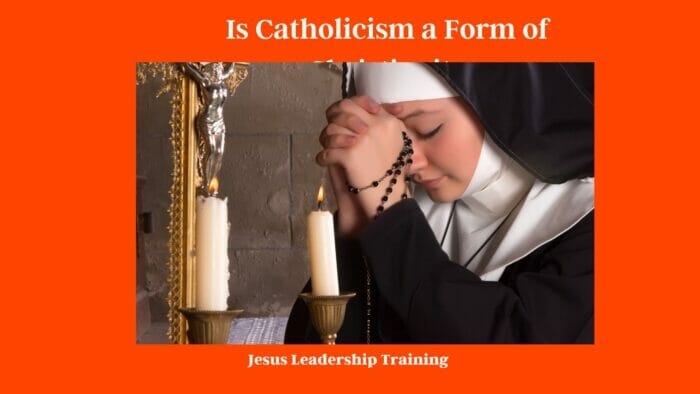In this comprehensive article, we delve into the question, “Is Catholicism a form of Christianity?” Exploring the biblical definition of Christianity, Catholic beliefs and practices, differences in marriage, the biggest distinctions, and the variations in their respective Bibles. Gain insights into the rich history and global impact of both Catholicism and Christianity.
Catholicism and Christianity are two major branches of the Christian faith. While many consider Catholicism to be a form of Christianity, there are distinctions that set them apart. In this article, we will explore the biblical definition of Christianity, delve into Catholic beliefs and practices, highlight the differences in marriage traditions, explore the biggest distinctions between the two, and investigate the variations in their respective Bibles. By the end, you’ll have a clearer understanding of the relationship between Catholicism and Christianity, and their respective impacts on the world.
| Topic | Christianity | Catholicism |
|---|---|---|
| Nature of Authority | Typically, most Christian denominations place primary authority in the Bible, the inspired word of God, and believe that individuals can have a direct relationship with God. Some denominations may have certain established hierarchies, but this can greatly vary. | Catholicism, a branch of Christianity, believes in the authority of the Bible but also in the authority of Church Tradition and the Magisterium (the teaching authority of the Church, primarily exercised by bishops and the Pope). The Pope, as the Bishop of Rome, is seen as the spiritual successor to Saint Peter and holds a special authority. |
| Sacraments | Protestant Christianity generally recognizes two sacraments: baptism and the Lord’s Supper (or Communion). However, this can vary among different denominations. | Catholicism recognizes seven sacraments: baptism, confirmation, the Eucharist (Communion), reconciliation (confession), anointing of the sick, marriage, and holy orders. |
| The Eucharist (Communion) | Many Christian denominations view Communion as a symbolic act that commemorates the Last Supper and Christ’s death. The bread and wine are seen as symbols of Christ’s body and blood. | Catholics believe in Transubstantiation, which is the belief that the bread and wine used in the Eucharist become the actual body and blood of Christ when consecrated during Mass. The substances do not physically change, but Catholics believe their essence does. |
| Saints and Mary | In most Christian denominations, the term “saint” is used more broadly to refer to anyone who is a believer in Christ. Mary, the mother of Jesus, is respected, but not accorded any special status beyond being his earthly mother. | Catholics honor Mary with a special status as the “Mother of God” and “Queen of Heaven.” They also venerate saints and believe that they can intercede with God on behalf of believers. The process of declaring someone a saint is formal and thorough in the Catholic Church. |
| Views on Salvation | In Protestant Christianity, salvation is often understood as being by faith alone (“sola fide”) — a personal faith in Jesus Christ is what leads to one’s salvation. | In Catholicism, faith in Jesus is essential for salvation, but Catholics also believe that faith must be lived out through love and obedience to the commandments of God and the Church. Good works, participating in the sacraments, and the intercession of the Church are seen as playing a role in salvation. |

Please note that “Christianity” is a broad term that encompasses a multitude of denominations, including Catholicism. The comparisons made here are more aligned with Protestant Christianity, and even within that, there is a significant range of beliefs and practices. It’s always crucial to remember the diversity within these categories.

Table of Contents
Biblical Definition of Christianity
Christianity, at its core, is a monotheistic religion centered around the belief in Jesus Christ as the Son of God and the savior of humanity. It is founded on the teachings, life, death, and resurrection of Jesus as recorded in the Bible. Followers of Christianity are often referred to as believers, followers, or disciples.
Believer
A believer in Christianity is someone who has accepted Jesus Christ as their Lord and Savior. They have faith in the divinity of Christ and the salvation offered through His sacrifice on the cross. Believers adhere to the teachings of the Bible and strive to live a life that aligns with Christian values.
Follower
A follower of Christianity actively follows the teachings of Jesus Christ and seeks to emulate His example. They believe in the importance of love, compassion, forgiveness, and serving others as demonstrated by Jesus during His time on Earth.
Disciple
A disciple of Christianity goes beyond being a mere follower. Discipleship involves a deeper commitment to learning from and following Christ. Disciples often seek to spread the message of Christianity and make more disciples through evangelism.

What Do Catholics Believe?
Catholicism is one of the largest denominations within Christianity, and its followers are known as Catholics. While Catholics share many fundamental beliefs with other Christians, they also have distinctive practices and doctrines that set them apart.
God
Like other Christians, Catholics believe in the existence of one God, who is the Creator of the universe and the ultimate source of all things.
| Major Beliefs in the Catholic Church | Description |
|---|---|
| The Holy Trinity | The belief in one God in three Persons: Father, Son, and Holy Spirit. |
| Jesus Christ | The belief that Jesus Christ is the Son of God, became incarnate from the Virgin Mary, died for the sins of humanity, and resurrected. He is both fully God and fully man. |
| The Church | The belief in the Catholic Church as the body of Christ on Earth. The Pope, as the Bishop of Rome, is the leader of the global Catholic Church. |
| The Sacraments | The belief in seven sacraments: baptism, confirmation, the Eucharist, reconciliation (confession), anointing of the sick, marriage, and holy orders. These are seen as channels of God’s grace. |
| The Communion of Saints | The belief in a spiritual union of all Christians — those on earth, in heaven, and in purgatory. The saints are seen as models of faith and can intercede with God on behalf of the faithful. |
| The Bible and Tradition | The belief in the Bible as the inspired word of God, as well as in the importance of Church Tradition, which includes the writings of Church Fathers, Church councils, and the Pope. |
| The Virgin Mary | The belief in the special role of the Virgin Mary as the Mother of God. Mary is seen as a model of faithfulness and is venerated. |
| Life After Death | The belief in eternal life, judgement after death, and the realities of heaven, purgatory, and hell. |
| The Real Presence of Christ in the Eucharist | The belief in transubstantiation, which means that during the Eucharist, the bread and wine become the body and blood of Christ. |
| The Commandments | The belief in the Ten Commandments and the teachings of Jesus as guides for moral and ethical living. The Catholic Church also recognizes its own set of precepts. |
| The Importance of Prayer | Prayer, both communal and personal, is seen as a fundamental part of spiritual life. The Lord’s Prayer, the Hail Mary, and the Rosary are common Catholic prayers. |

These are some of the major beliefs of the Catholic Church, though this is not an exhaustive list. The catechism of the Catholic Church provides a more comprehensive overview of the Catholic faith.
Trinity
Catholics, along with other Christians, embrace the doctrine of the Trinity, which teaches that God exists as three persons—Father, Son (Jesus Christ), and Holy Spirit—in one divine essence.
Virgin Mary
One notable aspect of Catholic theology is the veneration of the Virgin Mary. Catholics believe that Mary, the mother of Jesus, was a perpetual virgin and was specially chosen by God to bear His Son.
No Meat on Friday
In observance of the Catholic practice of abstinence, Catholics traditionally abstain from eating meat on Fridays as a form of penance and remembrance of Christ’s sacrifice on Good Friday.
5 Beliefs and Practices of Catholicism
Beyond the shared beliefs with Christianity, there are several specific beliefs and practices that are distinct to Catholicism.
Catholic Marriage Rules
Catholic marriage is considered a sacrament and is regarded as a lifelong commitment between a man and a woman. The union is blessed by God, and divorce is generally not accepted by the Church.
| Guidelines for Marriage in the Catholic Church | Description |
|---|---|
| Sacrament of Matrimony | Catholic marriage is a sacrament, a divine institution that imparts grace. It symbolizes Christ’s love for the Church. |
| Free Consent | Both parties must freely choose to enter into the marriage. |
| Lifelong Commitment | Marriage in the Catholic Church is seen as a lifelong commitment, symbolized by the vows “till death do us part. |
| Openness to Children | Couples must be open to having children, as procreation is one of the key purposes of marriage according to the Church. |
| Faithfulness | The couple must commit to being faithful to each other, both emotionally and physically, for their entire lives. |
| Pre-Marital Preparation | Most dioceses require couples to undergo a period of pre-marital preparation, sometimes referred to as Pre-Cana, to ensure they fully understand the commitment they are making. |
| Canonical Form | The marriage must be celebrated in accordance with the canonical form, meaning it takes place in the presence of a bishop, priest, or deacon and at least two witnesses. |
| No Impediment | There should be no canonical impediment to the marriage. This includes being of minimum age, not being closely related, not being bound by religious vows, etc. |
| Marriage License | Like any other marriage, a marriage in the Catholic Church requires a civil marriage license from the local government. |
| Mixed Marriages | If a Catholic wishes to marry a non-Catholic, they usually need to receive a dispensation from their bishop. The non-Catholic partner does not have to convert, but the Catholic partner must promise to do all they can to raise their children as Catholics. |
Please note that this table summarizes general guidelines. Specific practices may vary depending on the particular diocese or parish. Always consult with a priest or deacon for accurate and detailed guidance.
Unmarried
Catholic priests and nuns take a vow of celibacy, committing themselves to a life of dedication to God and service to the Church.
Man and Woman
Catholicism adheres to the traditional view of marriage as being between a man and a woman, following biblical teachings.
Not Divorced – But Annulled
While divorce is not typically recognized by the Catholic Church, an annulment may be granted if a marriage is deemed invalid due to certain conditions not being met.
Must Raise Children Catholic
In Catholic marriages, parents are encouraged to raise their children in the Catholic faith and provide them with a religious education.
Difference Between Catholic and Christian Marriage
While both Catholics and other Christians consider marriage a sacred institution, there are notable differences in their respective marriage traditions.
Catholic Marriage Rules
As previously mentioned, Catholic marriage is considered a sacrament, and the ceremony takes place within the context of a Catholic mass.
Unmarried
Non-Catholic Christian traditions often do not require clergy members to be unmarried. Pastors and ministers in these denominations can marry and have families.
Man and Woman
Many Christian denominations now recognize and perform marriages between same-sex couples, a practice not accepted within the Catholic Church.
Not Divorced – But Annulled
Some Christian denominations permit divorce and remarriage, while Catholicism does not accept divorce. However, an annulment may be granted in certain circumstances.
Must Raise Children Catholic
While some Christian parents may raise their children within their faith, it is not a requirement as it is in Catholicism.
Biggest Difference Between Catholic and Christian
While Catholicism and other Christian traditions share a common foundation in Jesus Christ, there are significant differences that distinguish them.
Baptism
Baptism is a fundamental Christian rite of initiation, symbolizing the cleansing of sins and entry into the Christian faith. While all Christians practice baptism, the specific rituals and beliefs surrounding the sacrament may vary among denominations.
Dress of Clergy
Catholic clergy, including priests and bishops, are often recognized by their distinctive clerical attire, such as cassocks and clerical collars. In contrast, non-Catholic Christian clergy may dress more casually, reflecting the traditions of their specific denomination.
Head of Church
In Catholicism, the Pope is considered the supreme authority and head of the Church. Other Christian denominations, such as Protestantism, have a more decentralized structure without a singular central authority figure.
Building Structures
Catholic churches are often characterized by their ornate architecture and elaborate decorations, reflecting the reverence and significance attached to the sacraments. Non-Catholic Christian churches may vary in architectural style and adornments.
Global Outreach Over the Ages
Catholicism has a long history of global outreach and missionary work, resulting in a widespread presence in many countries. While other Christian denominations also engage in missionary activities, the scale and historical impact of Catholic missions are significant.
Difference Between Catholic and Christian Bible
While both Catholics and other Christians follow the Bible as a sacred text, there are differences in the composition of their respective Bibles.
Deuterocanonical Books
The Catholic Bible includes additional books known as the Deuterocanonical or Apocryphal books, which are not found in Protestant Bibles.
7 Books in Catholic Bible Not in Protestant
These seven books include:
- Baruch
- Judith
- 1 and 2 Maccabees
- Sirach (Ecclesiasticus)
- Tobit
- Wisdom (Wisdom of Solomon)
| Apocryphal Books in the Catholic Bible | Description |
|---|---|
| Tobit | A narrative about a righteous Israelite of the Tribe of Naphtali named Tobit and his son, Tobias. |
| Judith | A beautiful and devout Jewish widow saves her people by deceitfully murdering the Assyrian general, Holofernes. |
| Wisdom (or Wisdom of Solomon) | A book of wisdom literature that praises wisdom as the way to live justly and piously before God. |
| Sirach (or Ecclesiasticus) | A collection of ethical teachings and maxims by the scribe Jesus ben Sirach. |
| Baruch (with the Letter of Jeremiah) | A book attributed to Baruch, secretary to the prophet Jeremiah, containing prayers of confession and a reflection on wisdom. |
| First Maccabees | A historical account of the revolt of the Maccabees against the Seleucid Empire in the 2nd century BCE. |
| Second Maccabees | A more philosophical and condensed account of the Maccabean revolt, with an emphasis on the martyrdoms of the conflict. |
| Additions to Daniel (The Prayer of Azariah and Song of the Three Holy Children, Susanna, and Bel and the Dragon) | Three separate additions to the book of Daniel, not present in the Hebrew/Aramaic text. |
| Additions to Esther | Additional narrative and prayers that appear in some ancient versions of the book of Esther. |
The term “apocrypha” typically refers to these books not included in the Jewish and Protestant Bibles, but which are part of the canon of the Roman Catholic and Orthodox Churches. They are also known as “deuterocanonical” books, a term meaning “second canon.” These books are considered by the Catholic Church to be inspired and part of Sacred Scripture.
Final Thoughts
In conclusion, Catholicism is indeed a form of Christianity, and while they share common beliefs, there are distinct differences that set them apart. Catholics hold unique practices and traditions that reflect their rich history and doctrine. Understanding these differences can foster greater appreciation for the diversity within the Christian faith and its impact on the lives of believers worldwide.





